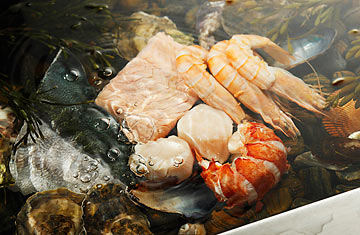
"First follow nature," wrote Alexander Pope, but nowadays no one has to tell that to the top toque wearers.
Chefs around the world have come to embrace what might be called the New Naturalism — a culinary dogma that practically verges on the pantheistic. West Coast superchef Michael Mina is even going so far as to poach fish in actual seawater at his Vegas restaurant American Fish. Unfortunately, like all infatuations, this one comes with some baggage.
First, though, let's make one thing clear. The idea of natural cooking is neither new nor, really, even an idea, properly speaking. It's the way everybody in the world always cooked, which was briefly obscured for a few years in specific places, i.e., Western restaurants in the 19th and 20th centuries. And not even for all of that time: by the 1970s, the so-called fresh-food revolution was on, and Alice Waters was serving statement salads at her influential California restaurant Chez Panisse. The idea got bigger and bigger and won the hearts of Gen X chefs in the 1990s. What New York magazine critic Adam Platt called "haute barnyard" had come to define America. Words like seasonal, local and, best of all, green market were shibboleths for every self-respecting cook from potato peeler on up. It made for a lot of roasted heritage pork and hand-foraged hen of the woods mushrooms, but it's something of a stylistic dead end.
And now, alas, the movement appears to have entered its baroque phase. Consider Mina's preposterous fish. There's no doubt that poaching a fish in seawater produces an effect different from that of salted tap water, or broth, or whatever. But they had to fly that water a thousand miles in a jet plane to get it to Vegas! What can be more unnatural than that? Mina sees the technique as the ultimate in no-frills cookery ("there's literally nothing to it"), but even he admits it's not exactly a feat of conservation. Nor do the mom-and-pop bistros of Portland, Ore., or Nashville have it any better: even customers who are as green as the Lorax want Scottish salmon and Colorado lamb on their table. And the chef, who's tried bland farmed salmon and the gnarly chops from the farm up the road, doesn't blame them at all.
There's no bad faith at work; it's just that the New Naturalism requires strenuous applications of machine technology. It's dramatic in the way it presents natural food — for $35 — but also artificial. The only things that keeps it from being laughable or a rip-off are that the chef totally believes in it and that it celebrates a very real value: the value of fresh fish. It's easy to make fun of the New Naturalism, but at its heart is an almost Shinto-like reverence for nature. Tom Colicchio, who helped found the modern green-market-gastronomy movement at Gramercy Tavern and then Craft, says, "Some people think manipulating food is the job a chef does. It isn't. Flavor comes first. You treat it with respect and keep its natural taste. I want people to say, 'I never knew scallops tasted like this.' "
But that's the crux of the problem for the movement. If "simple" cooking ("getting out of the way" is how most chefs put it) is the best, why do you need a chef at all? Or three-star (or any) restaurants? Every chef has his story he likes to tell of eating a boiled chicken some Swiss farmer gave him once, and how perfect it was. But he doesn't measure himself by Swiss farmers. He looks at Alain Passard, whose three-star Paris restaurant treats vegetables as if they were as precious as plutonium. He looks at Japan's Yoshihiro Narisawa, who recently demonstrated a method of using sawdust broth, twigs and wood strips to cook venison. He looks at the young Spanish prodigy Andoni Luis Aduriz, who has come up with a limestone slurry with which to gel-coat his vegetables. At this level, you're paying for technique, not what some guy can pick off the trees. New York culinary bad boy David Chang said as much recently when calling out his West Coast rivals for "just serving figs on a plate." Chefs need to do something. A love of nature is great, but it doesn't get you seawater when you're in the desert.
Ozersky is a James Beard Award–winning food writer and the author of The Hamburger: A History. You can listen to his weekly show at the Heritage Radio Network and read his column on home cooking at Rachael Ray's website. He is currently at work on a biography of Colonel Sanders.
